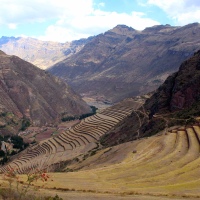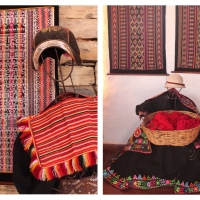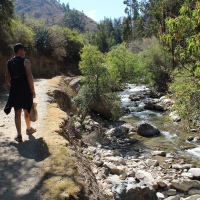Pay a visit to any of South America's cities and you will quickly be struck by the contrasts. In Buenos Aires you will see piles of rubbish at the feet of glass towers. In Rio de Janeiro, large favelas face towards multimillion dollar penthouse apartments. In Sao Paulo, Brazil's economic powerhouse, the super wealthy travel by helicopter, spending their working days in the sky while the unemployed struggle to survive on the streets.
During our stay in Sao Paulo we were inspired to try and understand what these contrasts mean for the people that live there. Specifically, we wanted to meet Sao Paulo's waste pickers, who make a living collecting rubbish and picking out the valuable material for sale.
We first learned about waste pickers, as they are called, through a documentary based in India. We were confronted by the health issues that people working in land fills or collecting on the streets must risk (infected cuts, respitory disease etc). Some waste pickers live and work on municipal dumps – as many as 20,000 people in Kolkata, India. Bear in mind that some of these landfills are massive (Rio closed the world's largest open landfill last year).
We wanted to understand what working on the streets is like for Sao Paulo's poor and to also better understand if and how people are able to make a living from collecting waste.
Our friend Miranda kindly organised a meeting with the Pinheiros Collective, a small group of waste pickers that had a work space near where we were staying.
The Pinheiros Collective was formed by a small group of waste pickers who at the time were either living on the streets or in shared lodgings. Using carts that they pulled by hand, they would walk the streets at night, collecting trash that had been put on the streets by businesses and households. The trash would then be picked through to determine what was valuable and could be onsold.
In effect, the waste pickers provide an informal trash collection and recycling service. They make money by selling materials such as copper, aluminium cans, paper and plastic bottles to companies that can reuse them. We saw that in Buenos Aires and Sao Paulo they contributed to improved environmental sanitation by removing waste from urban areas unserved by municipal garbage collection.
After a chance community event, six waste pickers were inspired to combine their efforts and form a collective. Through a bit of lobbying they secured some council land and by pooling their resources, over time they saved enough money to purchase vehicles to collect rubbish.
The co-op now employs 21 staff. It has successfully sought registration with the government and has been awarded small grants from banks. Working conditions have steadily improved. The staff now use a compactor to compress materials into sellable bricks, where before they had to do it by hand. Work hours are now during the day thanks to the vehicles and a kitchen has been built to serve lunches for the staff.
The impact on their quality of life is impressive. The members of the collective are now earning twice the minimum wage, around USD700 a month, enough to feed a family. They have all moved off the streets and are pooling funding to build humble apartments for their families. Fees are also collected from each member to provide accident/health insurance.
It is not all milk and honey though. Their work place is located under a bridge, which periodically floods and hosts a swarm of mosquitoes. The staff complain of a lingering prejudice against waste pickers and shared stories of bullying from the police. The collective is pushing to be recognised as a legitimate workforce that provides a valuable sevice but struggles to engage with the government.
The Pinheiros Collective is a good case study as it reflects similar group actions taking place across Brazil. Waste pickers are evolving into a politically mobilised and networked labour force. They have a national body that organises events to share success stories and lobby government to recognise their services and remove the social stigma that many waste pickers face.
It is inspiring stuff. Hope you enjoyed this post. We really appreciated the time given to us by the staff and enjoyed being able to share such a positive story. We think its an interesting model for service provision in poor communities, easily replicated with a bit of support. Please share your thoughts in the comments section below.
If you would like to learn more about waste pickers we recommend the following as a starting point:
Don't Waste People, a documentary by Julia Waterhouse (forthcoming)
Women in Informal Employment: Globalising and Organising, Waste Pickers
Many thanks to Miranda for her patient translation and shared interest in our slightly unusual idea. We couldn't have managed it without you!
Thanks for reading.

















April 24th, 2013 at 8:52 pm
Thanks for putting in the time to bring us such an informative and detailed post. Great to hear a success story like this. Thank you.
April 24th, 2013 at 10:15 pm
Thanks for checking us out.
May 1st, 2013 at 1:24 pm
I’m wondering about no mention of flies or rodents.Is the organic (food) waste separate? If so, they are already ahead of many cities in the U.S. Interesting stories that the ruling classes don’t know about, or maybe they don’t see them as a threat. Imagine if food waste was composted and then nutrients reintroduced after freed by microorganisms- and sold as fertilizer…
May 1st, 2013 at 2:08 pm
G’day.
Thanks for your comments. We did not see any organic material and we did not talk about it on the day. We can only assume it was seperated out.
M&S
April 24th, 2013 at 8:53 pm
If, one group of people living off another groups waste can be considered a success that is… so difficult to find the phrases that fit with issues as loaded as this!
April 24th, 2013 at 9:32 pm
Great story! Check out the african artist El Anatsui. He is Ghanaian and produces incredible art with garbage. We saw his work at the Brooklyn Museum.
April 25th, 2013 at 1:47 am
Cheers, will do Michelle 🙂
April 24th, 2013 at 11:23 pm
Love this entry guys! So inspiring. I hope the collective is some day able to spread their thinking to other areas
April 25th, 2013 at 1:47 am
Thanks mate!
April 26th, 2013 at 3:20 pm
This was so inspirational! sometimes you get the impression that the world is destroying itself, but this is an example that you never must give up, always fight for you`r cause and have belief in that the world might be different one day! For each person you inspire, he might inspire 5 more!
April 26th, 2013 at 3:33 pm
I did see a documentory on RT russian television of palestinian
waste pickers whom scrape their living from Israeli trash dumps.
The differ in living vast Israeli’s with their swimming pools / their
grand homes / while palestinians in poverty lacking basic needs.
Greed of wealth lust of power but blinding /to the great injustice
the heart closed to compassion /mind replacing a working brain.
April 26th, 2013 at 3:43 pm
That is inspiring – I think it is wonderful when impoverished areas are able to use local resources (rather than outside help) to improve their quality of life because this is the only way that the improvements will truly be sustainable for the long run. Thank you for sharing this informative and interesting article.
-Jen
April 26th, 2013 at 4:17 pm
Reblogged this on Big Blue Dot Y'all and commented:
Take a wide look around.
April 26th, 2013 at 5:23 pm
Now I see it all in a different light, Imagine if this could be applied to cities too overflowing with people on the streets. Job creations and cleaner places! 🙂
April 26th, 2013 at 6:55 pm
I was n Brazil earlier this year. One thing that amazed me was all the graffitti all over the country. I thought this was disgraceful. I am glad that we don’t have that here in the US. There is a place for this type of art but not all over everywhere. What do you think?
April 27th, 2013 at 2:35 am
Hi there. We have mixed feelings. In many cases graffiti is used as a form of political expression, but as with Buenos Aires it can be too much.
April 27th, 2013 at 3:30 am
Thanks for your response! Interesting piece. http://www.segmation.wordpress.com
April 27th, 2013 at 10:27 pm
No problem. Our most recent post goes into this a bit further in case you are interested.
Regards,
Mark and Saskia
April 28th, 2013 at 2:18 pm
I will have to stop by and read it then! Thanks! http://www.segmation.com
April 26th, 2013 at 7:21 pm
Thanks for your post. Very informative and interesting!
April 26th, 2013 at 7:46 pm
Thank you for sharing how people live. We have much to be grateful for in Canada.
April 26th, 2013 at 9:00 pm
Thank you for an inspiring story!
Even though the world of today strive for an equality, there will always be people that consume and the ones that take all the garbage away from the reach of the firsts. Garbage have to disappear somehow, after all.
But these guys are doing a great thing, thanks again for sharing this story of success.
April 27th, 2013 at 2:42 pm
Hmm. There is certainly a stigma associated with collecting trash, possibly because trash is ‘dirty’. However there are companies in Sao Paulo that make a lot of money from recycling material such as copper and gold.
Perhaps the collecting of the trash is not so much the issue. Maybe it is the working conditions?
April 27th, 2013 at 2:04 am
It is indeed a very interesting story. Thanks for sharing with us.
April 27th, 2013 at 2:40 am
[…] One Man’s Trash is Another Man’s Treasure. […]
April 27th, 2013 at 4:22 am
what a story, it is indeed an inspiring story
April 27th, 2013 at 1:20 pm
What an interesting story. Thank you for sharing it.
It also reminds me of my own hometown right here in the US. My state, Michigan, has been hit hard by the loss of the auto industry. So many people are unemployed and desperate for cash. It’s pretty common to see “scrappers” drive up and down the neighborhood streets looking for scrap metal on trash days. I also drive around on trash days, but I’m looking for interesting art and garden pieces for my own home. It’s common to see old trucks over flowing with anything metal that was in the garbage.
It’s sad that we are doing this to survive, but at the same time it can be also seen as a positive effort, because the metal trash is getting recycled properly and not laying in the landfill.
It helps the environment and also financially helps those who really need it. The scrap metal recycling shops are constantly busy and being competitive on their scrap prices to get the business. That’s a bonus for the scrapper who needs the cash for food and housing. So, because of desperate circumstances it has become a win-win situation.
April 27th, 2013 at 2:30 pm
Thanks Claudine.
That’s a good story. Clearly people would rather carry work more appropriate to their skills but we agree that it is a win win situation. People can be so resourceful in the face of hardship, which we think both your and our stories demonstrate.
Mark and Saskia
April 27th, 2013 at 1:57 pm
I really hope that there is attention to the health issues for the workers working in sorting and handling the garbage.
April 27th, 2013 at 6:47 pm
I visited a landfill in California and saw a man picking out plastic bags that “escaped” from the garbage pile. He didn’t look very happy and it just shows that there’s different types of “waste pickers.” As an employee, was getting paid, but it’s not really work anyone would want to do on a daily basis
April 27th, 2013 at 7:12 pm
Have you ever seen the documentary called Wasteland? http://www.wastelandmovie.com/
April 27th, 2013 at 9:53 pm
Hi Kathleen,
No but we had heard of it, a good recommendation. Thanks!
Mark and Saskia
April 28th, 2013 at 1:30 am
What an impressive story – thank you so much for sharing!
April 28th, 2013 at 2:19 am
Thanks 🙂
April 28th, 2013 at 2:09 pm
I pre-empt the waste-pickers by re-cycling from home. If you’ve never felt the joy of accomplishment from deconstructing a cardboard box, seeing how ingeniously someone figured how to fold and join stiff fibermasses into boxes, and having shrunk a landfill somewhere by the teeniest fraction, go find someone who places a bin of recyclable items out for pickup and beg to give it a watch—and then a try, yourself!
April 28th, 2013 at 6:54 pm
Thanks for taking the time to share this post with us! It makes me see things in a different light. 🙂
April 28th, 2013 at 8:29 pm
very good post! as things are around here, I see myself deshechan recojiendo which ones to sell and deliver food to my son, I will if I have no choice … very cool post
April 29th, 2013 at 1:27 am
one man’s pleasure is another man’s pain
April 29th, 2013 at 2:49 am
Reblogged this on sincerelylife and commented:
RECYCLE!!!!!!!!!!!!!!!!!!!!
April 29th, 2013 at 2:54 am
Reblogged this on LeXie.
April 29th, 2013 at 10:37 am
It is a good concept that could be applied to any South American city.
April 29th, 2013 at 10:37 pm
Being an avid recycle person, I fully understand in this modern throw it away society, (world wide) that we still need to use things for a longer period of time.
April 30th, 2013 at 2:30 am
People should think green these days.We should be inclined to sustainable development and make ways to upgrade our recycling technologies. In this way we could at least help save mother Earth. Love this post!
April 30th, 2013 at 12:34 pm
Reblogged this on angelwonder.
April 30th, 2013 at 2:16 pm
Reblogged this on Silent Observer.
April 30th, 2013 at 9:20 pm
[…] One Man’s Trash Is Another Man’s Treasure: No, one man’s trash is another man’s garbage golem. […]
May 3rd, 2013 at 4:21 pm
Reblogged this on Jin Kim and commented:
Trasure = Waste
May 3rd, 2013 at 7:02 pm
Inspiring, but I have a question, well, two: what did registration of the group do? Is it that police no longer see them as a problem? And what kind of grants did the banks provide? Were they loans backed by some government program or a “being good community citizen” type of thing on the part of the banks themselves? Wonder how easy it would be to replicate this kind of success in other environments.
May 3rd, 2013 at 9:58 pm
Good questions. Registration made them a legitimate entity. It is typical in most countries, developed and developing, for both businesses and civil society groups to have to register themselves with the gov. As we understood it this step then made it easier to secure some land for the operation and funding from the banks.
On the banks, these were community grants. We heard several stories of banks donating funding to community projects in Brazil. However, we think a micro loan could have been feasible.
May 4th, 2013 at 7:09 pm
Thank you for all the work you did for this story …and for sharing the info!
May 5th, 2013 at 12:01 pm
Reblogged this on Page;Up.
May 5th, 2013 at 12:02 pm
Thanks for sharing! It’s worth reading.
🙂
May 5th, 2013 at 2:45 pm
Thanks!
May 5th, 2013 at 7:58 pm
This is a great post about workers I knew little about. Inspiring to read about a group of people working actively to change things.
May 6th, 2013 at 9:46 pm
Reblogged this on Imaginations of Expressions and commented:
This is true to save good treasure from the landfill. Protect our planet.
May 7th, 2013 at 5:36 am
Loved the post…
May 9th, 2013 at 2:16 pm
[…] One Man’s Trash is Another Man’s Treasure. […]
May 11th, 2013 at 1:14 pm
An inspiring insight to how some communities are empowering themselves through their own determination. Will be interesting to see what happens once they have demonstrated their idea is actually profitable…
I watched a disturbing documentary last night ‘Requiem for Detroit’ – as per Claudine’s comment about an American city being slowly cut up and how its communities and even the education system has fallen apart.
However even here there was evidence of a new community of self-determination developing with urban farms, street art and co-ops renovating abandoned homes. I wonder if more communities are slowly entering a new economic era where they feel able to unplug themselves from consumerism?
May 13th, 2013 at 5:56 pm
Thanks for that, great comments!
Would like to watch the doco but probably can’t access from Argentina.
If this was of interest we recommend the book Behind the Beautiful Forevers. It is a semi-fictional account of waste pickers in Mumbai. Still reading but it is great.
May 11th, 2013 at 3:38 pm
Some man in my country processing human waste tagged his hirer ‘Shit business is a serious business’. Your writing reminds me of that. Thanks for sharing.
May 13th, 2013 at 5:56 pm
Thanks for stopping by.
May 11th, 2013 at 7:29 pm
The growing and exponentially widening gap between the super rich and super poor is not documented enough. Thanks for documenting it. This article is inspiring.
May 13th, 2013 at 5:57 pm
Cheers!
May 14th, 2013 at 1:50 pm
This is such an informational piece that provides awareness to folks about the cultural aspects of other countries. Great content!
May 17th, 2013 at 7:40 pm
Thank you.
June 11th, 2013 at 8:46 pm
I am glad I read this today, it is very informative and very interesting.
June 13th, 2013 at 3:30 am
Thank you, appreciate the time spent.
November 4th, 2013 at 11:46 am
This is a great post. Always amazing to see the innovative ways ppl create jobs when there seems to be a shortage.
January 9th, 2014 at 12:04 am
[…] metal book locket | Under A Topaz Sky * japanese ledger binding: a tutorial | becca making faces * One Man’s Trash is Another Man’s Treasure | Flight of the Condors * Pantanal: Scenery | Flight of the Condors Pot-pourri n. […]